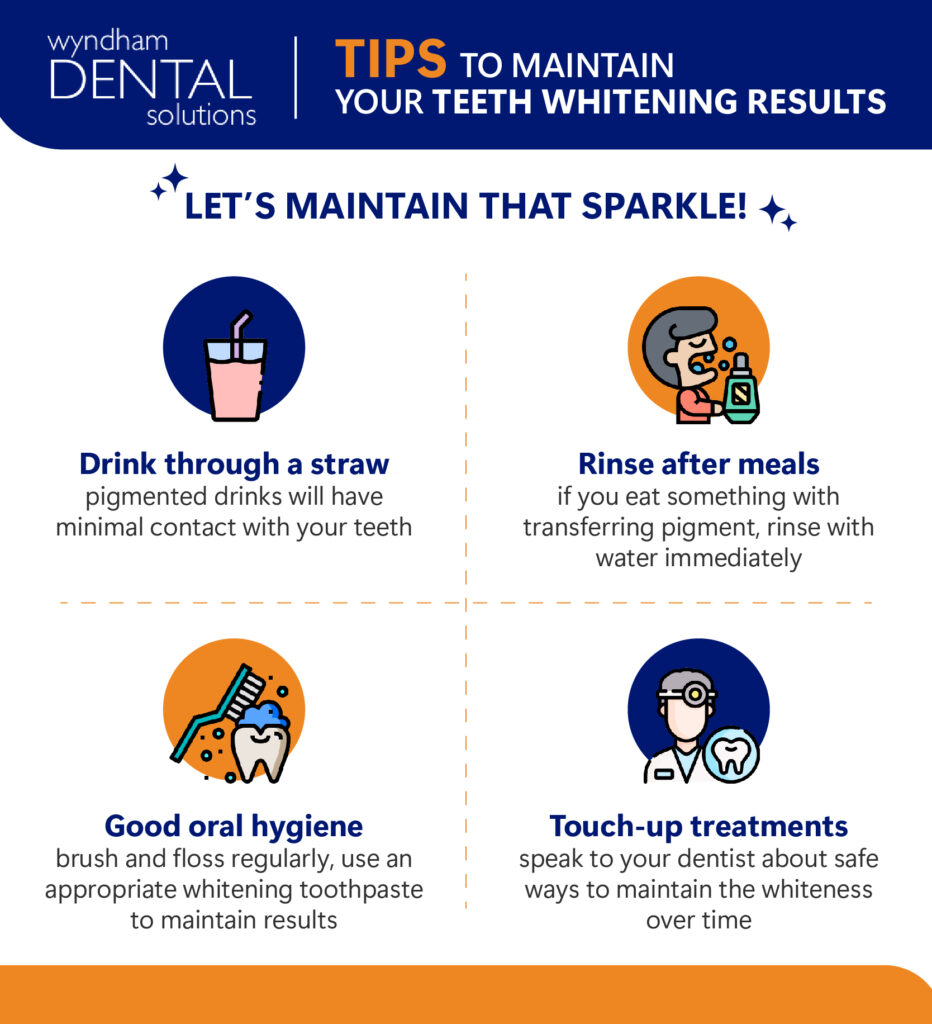Can You Eat After Teeth Whitening? What to Know

Getting your teeth whitened can leave you grinning from ear to ear. That confidence in your smile is unmatched! But once the procedure is done, one big question lingers: Can you eat afterwards? The short answer is yes, but what you eat matters a lot more than you might think. What you choose to eat and avoid eating immediately after treatment can make a big difference in how long your results last.
Let’s dig into everything you need to know about eating after teeth whitening, plus tips to help you maintain that bright, fresh smile.
Why You Need to Be Careful After Whitening
After professional whitening, whether in-chair or at home with a dentist-prescribed kit, your teeth temporarily become more porous. Teeth whitening works by opening the pores of your tooth enamel to remove deep-set stains. This means the enamel is vulnerable and more likely to absorb colours and stains from food and drinks. The process usually lasts 24 to 72 hours, which is why this period is often referred to as the “whitening window.”
During this time, what you consume can either help protect your results or quickly undo what was done to them. It’s important to treat your teeth with a bit of extra care, especially when it comes to what you eat and drink.
It’s not about starving yourself or avoiding flavour entirely, but more about making smart, stain-free choices that will help your smile stay whiter for longer.
Why Diet Matters After Whitening
Although incredibly strong, enamel is also porous. They are wider and more exposed after a whitening treatment, and this makes your teeth more absorbent, especially when colour and acidity are involved. So when you consume food or drinks with strong pigments like coffee, red wine, or red sauces, they can latch onto the tooth surface and dull your results faster than you’d expect.
This is why the first 48 hours post-whitening are so crucial. It’s not just about avoiding the stains, but also about giving your enamel the best chance to recover and remineralize.
What To Eat
During the whitening window, your safest bet is to follow what’s often called a ‘white diet’ – foods that are light in colour, low in acidity and not likely to leave residue behind. This includes simple, neutral options that are gentle on your teeth and won’t interfere with the whitening process.
- Chicken, turkey, white fish and tofu – plain and grilled, without sauces
- White rice or pasta – skip tomato sauces or soy-based additions
- Cauliflower, potatoes, mushrooms – steamed or boiled
- Bananas, peeled apples, pears – avoid any fruits with deep pigmentation
- White bread – preferably crustless
- Egg Whites – the deep yellow pigment of the yolk can stain
- Yoghurt, milk, cheese – stick to plain versions without added flavouring or colours
What to Avoid
Unfortunately, some of our favourite treats are the worst culprits when it comes to post-whitening damage.
- Coffee and tea – major culprits for staining
- Red wine – deeply pigmented and acidic
- Dark sauces – soy sauce, tomato sauce, curry, balsamic vinegar
- Berries and grapes – rich in colour and have natural sugars
- Chocolate and coloured sweets – dark chocolate and artificial colours in candy are a big no
- Beets and carrots – highly pigmented vegetables can stain
- Soft drinks and energy drinks – acidic and often dyed
- Smoking or vaping – tobacco can stain quickly and reduce the effects of whitening
Just remember, if it would stain a white shirt, then it’ll likely stain your freshly whitened teeth too.
How Long Should This Diet Continue
The critical period is between 24 and 48 hours, but most dentists would recommend being cautious for up to 72 hours, just to be on the safer side. Whitening your teeth is generally an expensive cosmetic dental procedure and should be cared for well to get your money’s worth. Three days of watching what you eat couldn’t hurt, could it?
That said, maintaining a stain-free diet throughout would ensure your smile stays bright and white! You don’t have to avoid your favourite red wine or morning espresso forever, but being mindful about moderation is key here.

The Bottom Line
Yes, you can eat after teeth whitening – but your newly shaded teeth depend on your choices in the first couple of days. Stick to pale, non-acidic foods, avoid the usual stain suspects, and give your enamel time to recover and remineralise. That way, you’ll get the most out of your whitening treatment and keep your smile shining brighter for longer.
Let your smile shine with confidence – book your customised teeth whitening treatment with Wyndham Dental. Contact us today.
